Issue #67: Reframing the choice to be childfree
'I'm one of life's aunties.' Introducing Intergenerational Conversations, a brand-new interview series on The Shoulds, featuring special guest Sam Baker.
Welcome (drum roll & whip out the navy carpet!) to Intergenerational Conversations, a brand-new interview series on The Shoulds. I’ve interviewed many fascinating people in my journalism & podcasting career (Lena Dunham, Mo Gawdat, Jane Fonda, Susan Cain & Alain de Botton among them), so an interview series seemed like a natural addition to this newsletter.
Thankfully, our community theme, The Shoulds, makes for excellent conversation fodder. Each of us is driven by a distinct set of Shoulds. That is, the internalised rules, principles & stories that govern our lives, stemming from our childhoods, our communities, and our relationships. There’s something powerful about sharing and exorcising them.
Two things to mention. Firstly, the ‘Intergenerational’ aspect. As many of you know, I recently went on a yoga retreat over New Year’s Eve. During this time, my fellow attendees and I had a lot of deep conversations, both in an individual and group settings. These were made particularly interesting because of the age range, which spanned four decades. It made me realise that, although Shoulds don’t go away, they do change over the course of your life.
It inspired this series, which feels most powerful if it’s done with at least a decade’s age gap between myself and interviewees. Otherwise, there was a risk of finding myself in an echo chamber of ‘Shoulds’ that prevail among thirtysomething women, and you hear enough of those from me already. This is a bit of a trial run. Ideally, I’ll aim for these conversations to be monthly – if they prove popular. Always open to feedback, of the good/bad/praise sandwich variety.
Format-wise, I’ve gone retro. While narrative-style reported interviews like the famous Lunch with the FT have maybe gained of a loftier status, personally I’ve always preferred a good, old-fashioned Q&A. This is a format I’ve seen revived in newsletters, particularly, with
’s ever-gorgeous Conversations on Love and ’s Author Questionnaire. For me, it’s a distilled version of another favourite medium, podcasting: with that same intimacy, that same rawness (or a least a lightly-polished version of it), that same platforming of the subject’s voice rather than the author’s narrative flourish.An intergenerational conversation with Sam Baker
“When you spend your time thinking about Shoulds, it stops you from actually doing.”
This particular sentence from our first interviewee,
, has lingered in my mind. It made me wonder: how much of our lives do we waste paralysed by the echoes of other people’s voices, holding us back from what we’d actually like to do?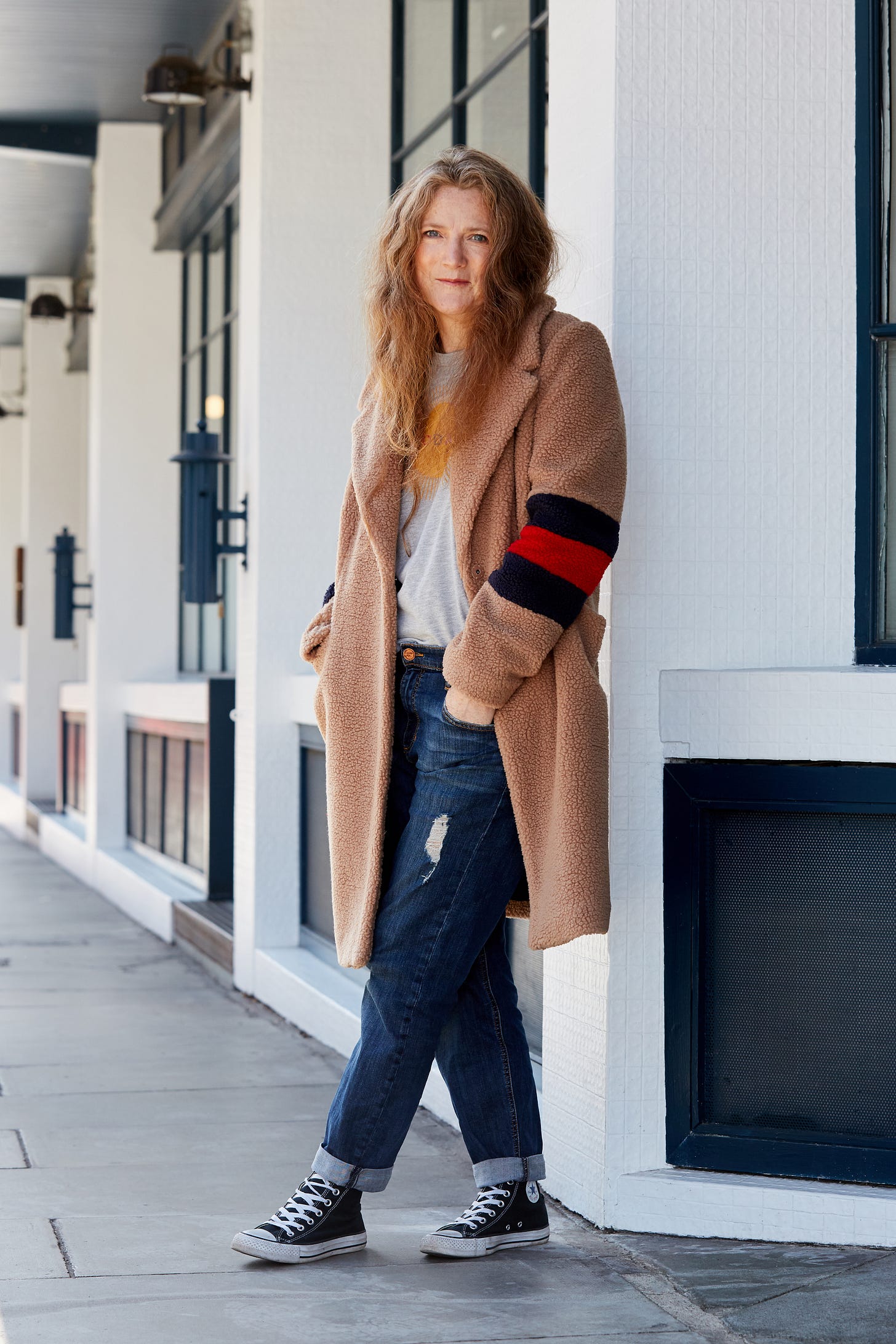
For those who aren’t aware, Sam Baker, 57, is the woman behind The Shift, a podcast & Substack newsletter that amplifies the voices of women aged 40 and above. She’s also a former magazine editor, having spent six years as editor-in-chief at Red (which I’ve written for and been a longtime subscriber of), together with Cosmopolitan, Company & Just Seventeen. She’s the author of several books, both fiction & non-fiction.
I’ve loved Sam’s work for years, so I’m chuffed she agreed to be my first guest. The Shift is one of the podcasts I have on rotation: Sam’s episodes with Annie MacManus, Anita Rani & Marian Keyes are particular highlights. Listening to it makes me excited to embrace every decade to come. This conversation had the same effect.
This interview is a whistle-stop tour through the ‘Shoulds’ which, Sam tells me, have characterised her life. We go from the relentless pressure to have children that Sam experienced for 14 years – despite, as she recounts, never having felt a desire to become a mother – to the toll that keeping up appearances took during her working life as a magazine editor; how the pressure to be a Good Girl (something recently covered by
) and hold off having sex during her first relationship is something she regrets; and why she fell out of love with the magazine industry.It’s a candid conversation, generously so, and, I hope you’ll agree, a cracking start to this series. Happy reading, and do get in touch in the comments section, I’d love to hear what you think.
I’ve left this first interview of the series un-paywalled, so you can get a taste of what’s to come. Going forward, these interviews will only be for paying members of The Shoulds’ community. So, do consider upgrading your subscription if you enjoy reading and would like to support my work going forward.
Now, on with the conversation…
What's the biggest Should that you remember, growing up?
My whole life feels like it's been characterised by Shoulds. I’ve spent the past five years trying to shake them off.
Growing up in the Seventies, the biggest one was always, ‘You should be a Good Girl’. There were certain societal norms laid out for women: you were expected to behave in a certain way. This was particularly true in my working class family. My parents married young and had children immediately; they were 22 when they had me. The emphasis was always on doing the right thing.
I never wanted to get into trouble. That was difficult to avoid in Andover, the suffocatingly small Hampshire town where I grew up. The joke was that if you sneezed one day, the next day the neighbour would ask you how your cold was. You could bunk off school, and think you’d avoided seeing any adults you knew – but your mum would know by the time you got home.
I remember there was always talk of what ‘good girls’ should and shouldn’t do: always do what you’re told, do the washing up. Don’t have sex too young, don’t smoke, don’t go out with that boy, don’t stay out too late. I didn't ever want to get into trouble. Now, I wish I hadn’t been so obedient. I wish I’d been naughtier.
What’s a Should that you wish you hadn’t listened to?
‘Don’t have sex before marriage’. Which I didn’t stick to – but, honestly? I wish I'd had sex with my first boyfriend. Or maybe my second one. Because the boyfriend I did lose my virginity to was the wrong one to have sex with for the first time. Does that make sense? I wish it had happened with someone who was also fumbling and didn't know what they were doing. Instead of doing what I did, which was to sleep with someone who had done it before, a lot – and took advantage of my inexperience.
What’s a Should that you’ve let go of?
‘You should worry about what people think’. I spent my working life worrying about what other people thought of me, and what they thought about my work. At the office, I experienced a constant internal battle: I was seeking my boss’s approval, while raging inside. I wasted far too much time worrying about how things looked.
And this began pre-internet! It’s worse now, because you can look online to see what other people think – even, what they’re saying about you.
“From the year I got married, aged 26, until the year I turned 40, barely a week passed without someone asking me when I was going to have children.”
I really, really, really wish I hadn’t wasted all that time. It was debilitating. That goes for a lot of Shoulds, though. When you spend your time thinking about them, the Shoulds stops you from actually doing.
What changed? Perimenopause. It put a bomb under those parts of my personality. I started to question: Why am I doing this? I'm not doing this for me. I'm not getting anything out of it.
I'm 32. Is there a particular Should that you recall feeling when you were my age?
‘You should have children’. From the year I got married, aged 26, until the year I turned 40, barely a week passed without someone asking me when I was going to have children. It was as if, ‘OK, you’ve ticked this box, you need to tick the next one.’ And it was the bane of my life.
When I was 32 – your age – I had just been made editor of Company magazine, after getting my first editor job aged 29 (at Just Seventeen magazine). I’d worked hard to get to this point in my career. I felt like I’d just made it, and I wasn’t prepared to get off the ladder.
Back then, I could see women around me who had had children, and their careers were plateauing. There were exceptions, of course, but they were a minority. It may even have still been acceptable, at that time, to ask whether you wanted children in job interviews. I didn’t virulently not want children, but I just didn’t have the internal bell, clock – whatever metaphor you want to use – going off. I’ve never felt broody. In fact, I only ever experienced that feeling on one occasion: when I was going through perimenopause, when I suddenly realised that ship had sailed.
We did stop using contraception for a while (sort of “leaving it to fate”), but I was always ambivalent. We never fell pregnant though and, given I’ve had an entire lifetime of gynaecological problems - polyps, fibroids and adenomyosis - I can’t help thinking that’s hardly surprising.
When I last worked in an office, my millennial colleagues introduced me to the acronym, ‘TTC’, or ‘Trying To Conceive’. That was never me. I’ve seen friends go through IVF. Some got pregnant after one round, others weren’t so lucky. One had seven rounds then miscarried, another had eight rounds and never conceived (both ended up adopting). I was never prepared to go through that.
When I was 44, my gynaecologist told me I was ‘almost out of eggs’ – right there on the bed, as I was sitting legs akimbo. Oh, that’s it then, I thought. It wasn’t so much regret as a physical gut punch. But then, I know people who have four or five children who say they still got that feeling when they realised there will be no more children; that that road is blocked by biology.
Nowadays, I’m relaxed about not having had children. I have a stepson who lived with us from the age of 10 – he no longer does, as he’s in his 30s. And I have godchildren. So I’m lucky, because I’ve had close relationships with children without much responsibility. I feel like I’m one of life’s aunties: good at buying presents for children, going to the cinema with them, feeding them inappropriate things and delivering them back happy. Honestly, I don’t think I would have been a great mum.
What's a Should that you're navigating regularly right now?
The main Should I've felt since menopause is: ‘Women of my age should shuffle off’. There’s a prevalent feeling that older women shouldn’t bother society with their grey hair, their wrinkles and their opinions that aren't relevant to anybody younger. It might not feel the case in your immediate family or friendship group, but it’s definitely something women experience at work or in the wider world. I was shocked when I first encountered that.
So it’s a Should that I'm navigating and actively railing against on a daily basis. My Substack newsletter and podcast, The Shift – where I interview women aged 40 and over, the oldest being 103 – is absolutely proving the antithesis of that.
Finally, what’s a core Should that you’re happy to hold yourself to?
‘You should always be able to look yourself in the eyes’.
Increasingly, as I moved up in the magazine hierarchy, the question of advertising came more into play. By the time I left, I felt uncomfortable. Business is business, of course, and businesses are there to make money. But I became increasingly uncomfortable with that world. One of the reasons I decided to leave, and find a different way for my career, was that I couldn’t look myself in the eyes in the mirror and say, with honesty, that I wasn’t making the occasional decision for the wrong reasons. Nowadays, working on The Shift, I’m know I’m doing it for the right reasons. I’m completely comfortable with everything that I say and do.
I wonder if that’s something that’s come with age. It’s a common thread among the women whom I speak to on The Shift. Aged 40 and over, they have a stronger focus on what’s going inside. Maybe, because society thinks what’s going on on the outside doesn’t have as much value anymore.
Trying…
I’m going back to school! By which I mean, I’ve started a six-month creative writing course at Curtis Brown Creative. It’s an in-person evening course, which takes place weekly. It’s where I hope to write my next draft of the novel I’ve been working on for a couple of years. Having had the kick-off session earlier this week, I’m already feeling grounded by the structured nature of the syllabus; pleasantly in awe of the talented tutor and fellow students; and ready to become a student again.
This is a hefty investment, both time-wise & financially, and I feel intensely grateful to be doing it. I’ll admit I shed a few happy tears upon returning home after session #1. I’m not yet sure how much I’ll share here going forward, but it’s going to be a big part of my life for the next six months (& beyond). And of course if anyone’s considering doing this course or a similar one, I’m always happy to answer questions (reply to this email address).
I ran out some of my pre-course nerves at my first Hampstead Heath Parkrun last Saturday at 9am. I won’t be scoring a personal best, or PB, any time soon, but it was an enjoyable (albeit muddy) way to start the weekend.
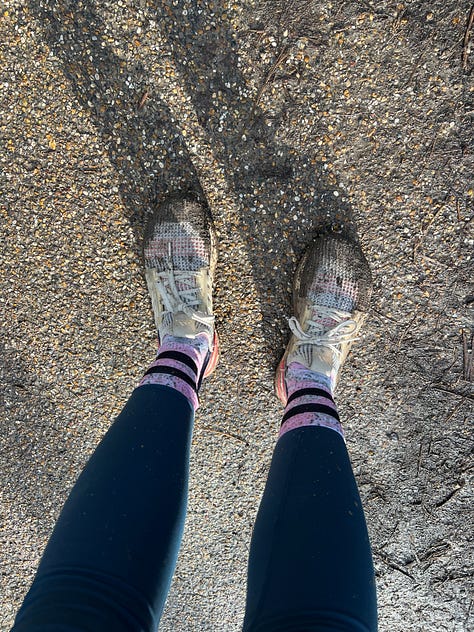
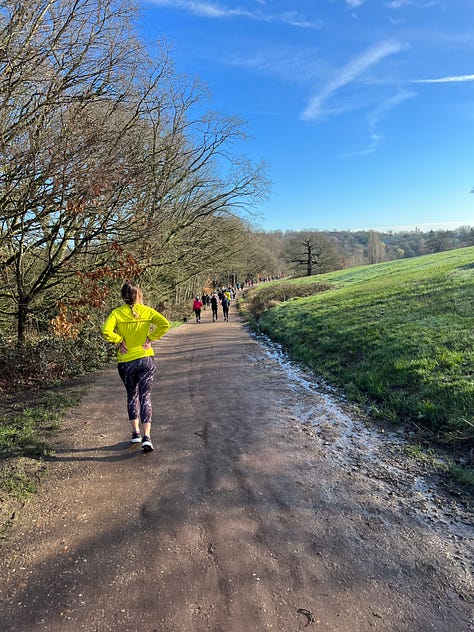

Consuming…
Ahead of starting my course, I spent last week hosting various friends for dinner at my flat, relying on some tried-and-tested recipes (including the delicious butter beans recipe I shared the other week), plus a new addition: Salmon pollitchattu from Meera Sodha. This one is a little fiddly, but is fun to make and easy to prep ahead for guests (just do the marinade then shove it under the grill oven close to when they arrive). Oh, and it’s a tasty, warming winter treat for a cold, rainy day. I served this with brown rice and roasted okra (which I sprinkled with garam masala and cashew nuts – YUM). Then, I had dinner at a friend’s last weekend, who cooked this amazing Sticky Sweet & Sour Plums & Sausages recipe from Ottolenghi’s Shelf Love. She also introduced me to boulangerie potatoes – a dauphinoise-esque recipe, made with stock instead of cream. Perfect for the dairy-averse and just as satisfying.
Until next week!
Francesca x


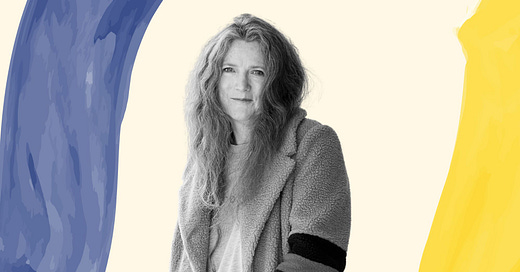





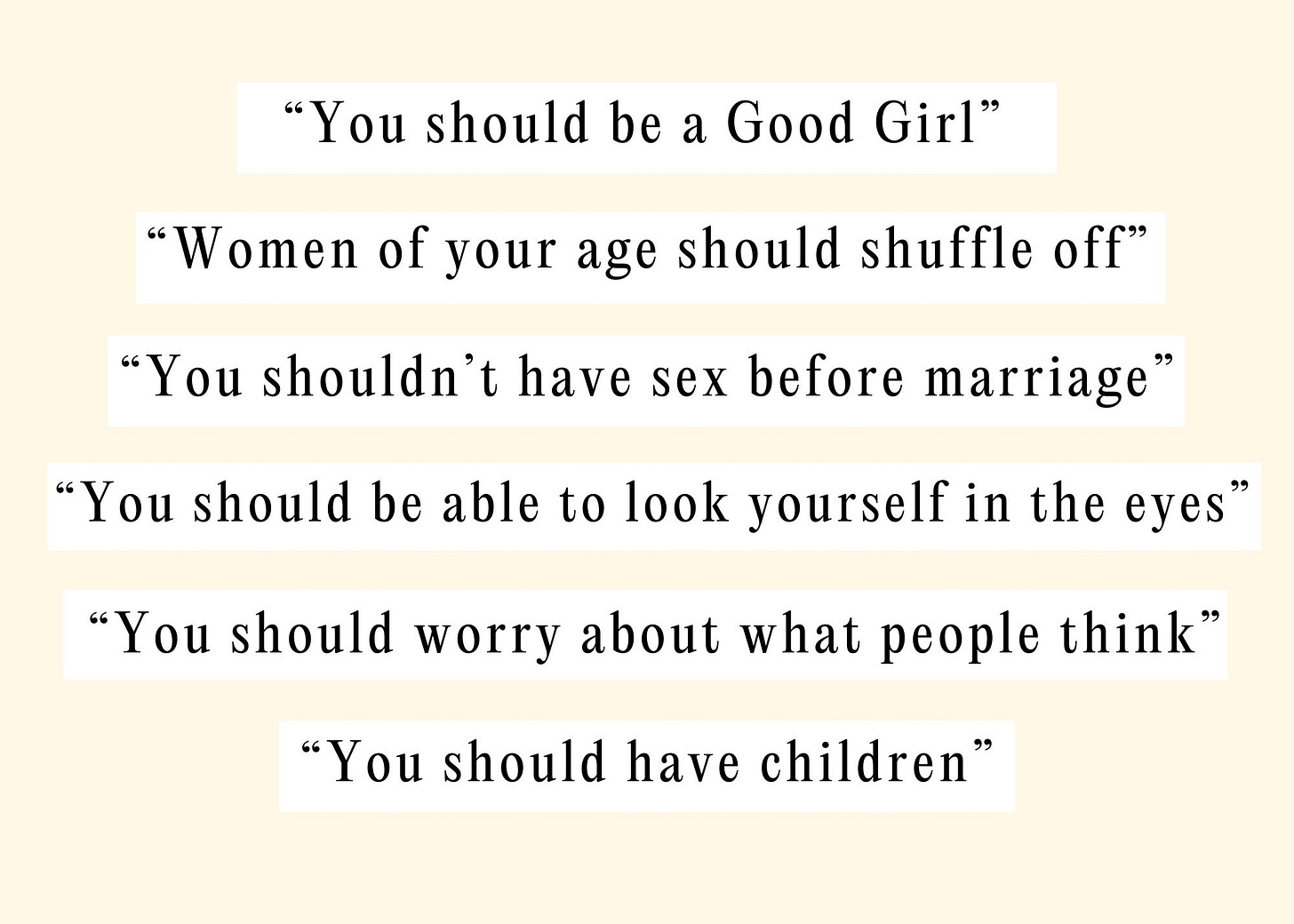


Loved the Q&A with Sam. I’m 55 and have so many generational and physical similarities to her story.
Wonderful. Thank you. Especially for the last ‘should’- you should always be able to look yourself in the eyes.